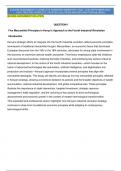ECS3705 ASSIGNMENT 2 (COMPLETE ANSWERS) SEMESTER 2 2024 - DUE SEPTEMBER 2024 ;
100% TRUSTED COMPLETE, TRUSTED SOLUTIONS AND EXPLANATIONS.@ UNISA
@UNISA ASSIGNMENT SOLUTION
QUESTION 1
Five Mercantilist Principles in Kenya’s Approach to the Fourth Industrial Revolution
Introduction
Kenya's strategic efforts to integrate into the fourth industrial revolution reflect economic principles
reminiscent of traditional mercantilist thought. Mercantilism, an economic theory that dominated
European discourse from the 16th to the 18th centuries, advocates for strong state involvement in
the economy to maximize national wealth and power. This theory emphasizes state-led initiatives
such as protectionist policies, fostering domestic industries, and prioritizing key sectors critical to
national development. In the context of the fourth industrial revolution—which focuses on the
fusion of advanced technologies like automation, artificial intelligence, and digitalization into
production and industry—Kenya's approach incorporates several principles that align with
mercantilist ideologies. This essay will identify and discuss five key mercantilist principles reflected
in Kenya's strategy, drawing connections between its policies and the broader objectives of wealth
accumulation, national industrial development, and global competitiveness. These principles
illustrate the importance of state intervention, targeted investment, strategic resource
management, trade regulation, and the nurturing of key sectors to drive technological
advancement and economic growth in the context of modern technological transformation.
This expanded and professional version highlights how Kenya's industrial revolution strategy
continues to draw from foundational economic principles while adapting to contemporary
technological shifts.
, ECS3705 ASSIGNMENT 2 (COMPLETE ANSWERS) SEMESTER 2 2024 - DUE SEPTEMBER 2024 ;
100% TRUSTED COMPLETE, TRUSTED SOLUTIONS AND EXPLANATIONS.@ UNISA
1. Trade protectionism and Imported Substitutes
Mercantile capitalism usually includes protecting local industries from foreign
competition including tariffs, subsidies, and other trade barriers. Although the text
does not expressly reference protectionist policies, the emphasis on building an
integrated steel plant implies a shift toward import substitution. Import substitution is a
mercantilist strategy in which a country aims to make things domestically that it would
otherwise import, thus minimizing its trade imbalance and maintaining wealth inside
the nation. Through establishing its steel and iron manufacturing sector, Kenya
intends to minimize its dependence on imported steel, which is critical for
industrialization. Domestic steel production would not only benefit Kenya's
infrastructure projects, but it would also allow the country to keep more of its wealth,
which would otherwise be spent on imports. This technique can assist balance trade
accounts and strengthen the national economy, achieving a traditional mercantilist
goal of reducing foreign dependency while increasing home production capacity (The
Star, 2024)
2. The State Interventions & Development of Industries
One of the core principles of mercantilism is the active role of the state in directing
economic activity, particularly in strategic industries. The extract highlights Kenya’s
focus on the development of the iron and steel industry through the establishment of
an integrated steel mill, which is a direct form of state intervention aimed at fostering
industrial growth. This approach reflects a traditional mercantilist belief that the
government should play a central role in the economic development of critical
industries to ensure national self-sufficiency and reduce dependency on foreign
imports.
The establishment of an integrated steel mill is a strategic decision that aligns with the
broader mercantilist goal of creating a self-sufficient economy that can produce its
own goods rather than relying on international trade. By investing in the steel industry,
the government aims to build a strong industrial base that will support other sectors
such as construction, manufacturing, and infrastructure development. This state-led




